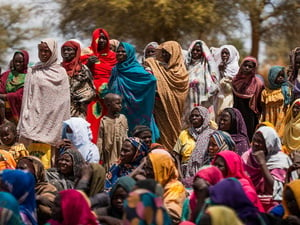UNHCR running out of funds as Afghan returns surge
UNHCR running out of funds as Afghan returns surge

Afghans prepare to return home at the Takhta Baig registration centre near Peshawar.
Geneva, April 2 (UNHCR) - More than 150,000 Afghans have gone back to their war-shattered country from neighbouring Pakistan since returns began on March 1st, straining UNHCR resources to the limit. "They are now returning at a rate of 50,000 a week," said UNHCR spokesman Rupert Colville.
Addressing a news briefing in Geneva on Tuesday April 2, Colville described the pace of returns as "phenomenal." He said on Monday alone more than 14,000 Afghans returned through the Takhta Baig registration centre near Peshawar in north-western Pakistan.
Colville likened the scope of the current Afghan returns to the 1992 repatriation, when 1.2 million Afghans returned from Pakistan in eight months after the fall of the Soviet-backed communist government in Kabul.
UNHCR said the speed of the return has quickly drained the funds UNHCR had earmarked for the repatriation. Those returning to Afghanistan receive a repatriation package from UNHCR, which includes a number of relief items as well as a cash grant.
Colville said UNHCR had received US$ 128 million out of a total of US$ 271 million requested in the last funding appeal for Afghanistan. He said all but US$ 2 million has been already spent. "If the numbers returning continue at such a rate, then obviously we may have to revise the appeal upwards," he said.
But as many Afghans opted to go back home, some were still trying to leave their country. Most said they were fleeing the effects of the drought that has had such a devastating effect on Afghanistan over the past four years.
UNHCR said the number of people waiting at the Chaman border crossing from south-eastern Afghanistan into Pakistan's Balochistan province had risen by another 10,000 over the past week, bringing the number of people in the waiting area near the border to more than 40,000.
UNHCR said it was in discussion with the group's elders, some of whom expressed the desire to go back to Afghanistan rather than wait to be allowed into Pakistan.
On Monday the UN's main food agency, the World Food Programme (WFP), started a distribution of food to those stuck in the border zone. A total of 7,000 families, some of whom have been in the waiting area for more than five weeks, will receive a food ration for 15 days. The remaining 2,200 families will be assisted by a donation of rice from the Pakistani government. UNHCR said the agency's staff and workers from partner organisations were also working to improve the water supply, sanitation and health facilities in the waiting area.
The 1979 Soviet invasion, followed by years of civil war and the harsh Taliban rule, have driven millions of Afghans from their homes. Pakistan alone hosts more than 2 million. An estimated 1.5 million have found refuge in Iran. Some 1.4 million people are displaced within Afghanistan itself. Hundreds of thousands more are scattered around the world.









